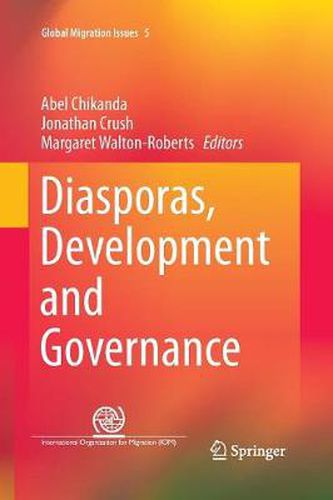Readings Newsletter
Become a Readings Member to make your shopping experience even easier.
Sign in or sign up for free!
You’re not far away from qualifying for FREE standard shipping within Australia
You’ve qualified for FREE standard shipping within Australia
The cart is loading…






This title is printed to order. This book may have been self-published. If so, we cannot guarantee the quality of the content. In the main most books will have gone through the editing process however some may not. We therefore suggest that you be aware of this before ordering this book. If in doubt check either the author or publisher’s details as we are unable to accept any returns unless they are faulty. Please contact us if you have any questions.
Drawing on examples from the global North and South, this book examines the relationship between migration, development and diaspora engagement from a governance perspective. It explores the ways that governments interact with their own extra-national diasporic populations in order to boost economic development, build global trading and investment networks, and increase their political leverage overseas. Inside, readers will find fifteen essays which highlight such issues as diaspora engagement by governments at different scales, the divisions that often exist within diaspora groups, diaspora transnationalism and return migration, diaspora knowledge networks and higher education capacity building, and the neglected issues of South-South migration and diasporas as well as North-South migration and diasporas. The book presents empirical case studies from various geographical contexts including Australia, Canada, the Philippines, India, the Caribbean, Zimbabwe, and the United States. Overall, this book presents fresh insights into how and why migrant-sending countries are increasingly turning to the diaspora option to attempt to benefit from the transfer of knowledge, skills and financial and social capital. It provides policy makers, researchers, and students with new perspectives on governance and the means by which states are attempting to utilize their diaspora resources.
$9.00 standard shipping within Australia
FREE standard shipping within Australia for orders over $100.00
Express & International shipping calculated at checkout
This title is printed to order. This book may have been self-published. If so, we cannot guarantee the quality of the content. In the main most books will have gone through the editing process however some may not. We therefore suggest that you be aware of this before ordering this book. If in doubt check either the author or publisher’s details as we are unable to accept any returns unless they are faulty. Please contact us if you have any questions.
Drawing on examples from the global North and South, this book examines the relationship between migration, development and diaspora engagement from a governance perspective. It explores the ways that governments interact with their own extra-national diasporic populations in order to boost economic development, build global trading and investment networks, and increase their political leverage overseas. Inside, readers will find fifteen essays which highlight such issues as diaspora engagement by governments at different scales, the divisions that often exist within diaspora groups, diaspora transnationalism and return migration, diaspora knowledge networks and higher education capacity building, and the neglected issues of South-South migration and diasporas as well as North-South migration and diasporas. The book presents empirical case studies from various geographical contexts including Australia, Canada, the Philippines, India, the Caribbean, Zimbabwe, and the United States. Overall, this book presents fresh insights into how and why migrant-sending countries are increasingly turning to the diaspora option to attempt to benefit from the transfer of knowledge, skills and financial and social capital. It provides policy makers, researchers, and students with new perspectives on governance and the means by which states are attempting to utilize their diaspora resources.